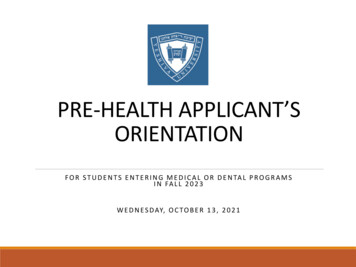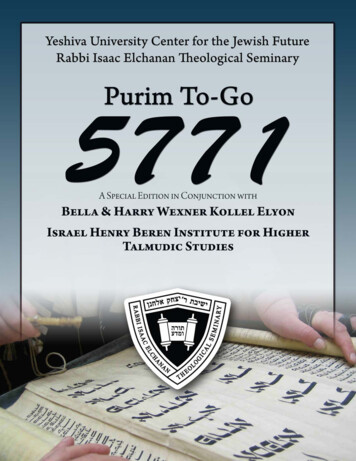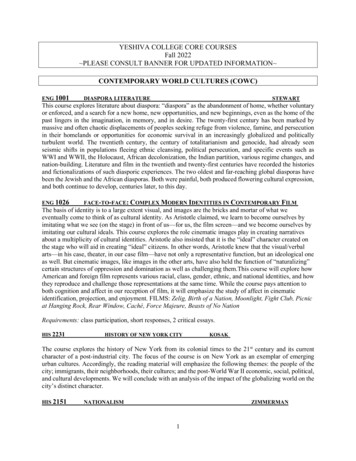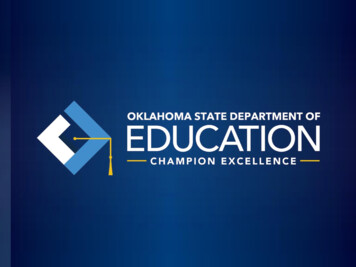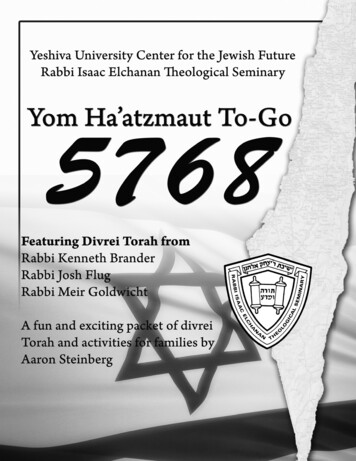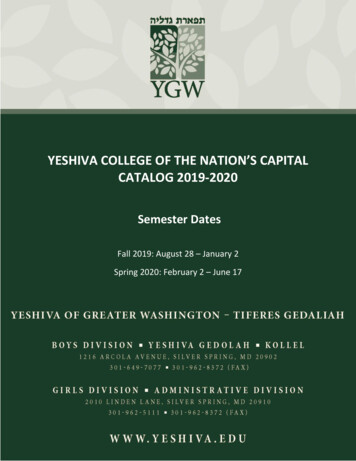
Transcription
YESHIVA COLLEGE OF THE NATION’S CAPITALCATALOG 2019-2020Semester DatesFall 2019: August 28 – January 2Spring 2020: February 2 – June 17
Table of ContentsTable of ContentsAcademic Calendar .3Institutional Philosophy . 4Mission Statement. 4Accreditation and Licensure . 4Non-Discriminatory Policy . 4Admissions . 5General Requirements . 5Placement Disclaimer . 5Board of Directors . 6Administration . 6Faculty . 6Faculty Vitae. 7Academic Program. 10Bachelor of Talmudic Law . 10Core Aspects of YCNC’s Curriculum . 10Core Curriculum . 11Explanation of Course Numbering . 12Sample Four Year Program . 11Textbooks and Required Materials . 14Course Listing, by Department . 14Department of Contemporary Applications of Jewish Law . 14Department of Talmud. 19Department of Biblical Literature . 22Department of Classical Jewish Philosophy . 23Advanced Standing Policy . 25Transfer Credit Policy . 25Advanced Credit Policy . 25Last Semester Policy . 26Transcript Policy . 26Page 1
Attendance Requirements . Error! Bookmark not defined.Tuition and Fees . 27Financial Aid . 27Withdrawal . 29Refund Policy . 29Return of Title IV Funds . 29Student Rights and Responsibilities . 31Grading System . 31Attendance. 31Satisfactory Academic Progress . 31Incompletes and Withdrawals . 33Repetition. 33Leave of Absence Policy . 33Grounds for Dismissal . 34Appeals Process, Mitigating Circumstances . 34Complaint Procedures . 35Internal Complaint Procedure . 35AARTS Complaint Procedure. 35Notification of Rights Under The Family Educational Rights and Privacy Act (FERPA) . 35Physical Facilities. 37Dormitories and Meals . 37Student Life . 37Library . 38Campus Security Procedures . 39Institutional Drug and Alcohol Policy. 411. Standards of Conduct Regarding Drug and Alcohol Use. 412. Legal Sanctions: Local, State and Federal . 413. Health Risks . 424. Available Counseling and Treatment . 435. Disciplinary Sanctions that the Institution Will Impose on Students . 43and Employees . 43Page 2
Academic CalendarPage 3
Institutional PhilosophyThe program at the Yeshiva College of the Nation’s Capital (YCNC) is directed toward thedevelopment of individuals whose lives will be enriched by devotion to learning. Excellence inintellectual and ethical pursuits is a common goal shared by the faculty and students of ourinstitution.Mission StatementThe mission of Yeshiva of Greater Washington - Tiferes Gedaliah is to root each student inTorah, plant a passion for learning and prepare them for life.The primary objective of Yeshiva College of the Nation’s Capital is to guide serious anddedicated students so that they will become mature and learned Jewish leaders. To supportthis objective, Yeshiva College of the Nation’s Capital provides an environment for students intheir formative years so that they will develop in learning and character and emerge with theskills and passions to be a deeply committed Torah Jew.Accreditation and LicensureYeshiva College of the Nation’s Capital offers a Bachelors of Talmudic Law degree. YCNC isaccredited by the Association of Advanced Rabbinical and Talmudic Schools (AARTS), 11Broadway, Suite 405, New York, NY 10004, (212) 363-1991.Yeshiva College of the Nation’s Capital is licensed by the Maryland Higher EducationCommission located in Annapolis, MD.Copies of the letter of accreditation and/or licensure are available from the administrativeoffices during regular business hours.Non-Discriminatory PolicyQualified Jewish men are admitted to the Yeshiva College of the Nation’s Capital without regardto age, race, color, national origin or physical handicap. Yeshiva College of the Nation’s Capitalis an Equal Opportunity Employer and is in compliance with Title VI of the Civil Rights Act of1964, Tile IX of the Education Amendments of 1972, Section 504 of the Rehabilitation Act of1973 and Americans with Disabilities Act of 1992.Beyond equal access, opportunity, and accommodation, Yeshiva College of the Nation’s Capitalis committed to the understanding, sensitivity, patience, encouragement, and support that areso vital to guaranteeing to all qualified students the same educational experience andenvironment, as well as the equal opportunity to learn and study at the institution.Page 4
AdmissionsJewish men are admitted to Yeshiva College of the Nation’s Capital without regard to race,color, national or ethnic origin, or disability. A formal application must be submitted to theYeshiva, addressed to:Yeshiva College of the Nation’s Capital1216 Arcola AvenueSilver Spring, MD 20902General RequirementsStudents applying to Yeshiva College of the Nation’s Capital must be high school graduates. Inaddition, they should have adequate preparation in Talmudic and related studies. Thefollowing are the minimum requirements:Talmud: The ability to read and comprehend basic Talmud with thecommentaries of Rashi and Tosafos.Bible: A working understanding and familiarity of the Bible in its originallanguage.Language: The ability to read and write classical Hebrew; a workingknowledge of the Aramaic language of the Talmud.All applicants for admission are required to report for a personal interview and evaluation atthe Yeshiva, as personality and character are important factors in determining the eligibility ofthe prospective student.Placement DisclaimerYeshiva College of the Nation’s Capital is an academic institution and does not providevocational training nor guarantee employment or placement to students who complete itsprograms.Page 5
Board of DirectorsRabbi Ahron Lopiansky, Rosh HaYeshivaDr. Michael Levine, PresidentDr. Marcel Reischer, Vice PresidentRabbi Ozzie Burnham, Vice PresidentMr. Kevin Babitz, TreasurerMr. Eli Rutstein, SecretaryAdministrationRabbi Ahron Lopiansky, Rosh HaYeshivaRabbi Yitzchok Merkin, PresidentMrs. Maryanna Walls, RegistrarMr. Daniel Ely, Executive DirectorRabbi Yitzchak Labell, YCNC Office AdministratorFacultyRabbi Ahron LopianskyRabbi Eliyahu ReingoldRabbi Eliezer KreiserRabbi Yitzchak ScherRabbi Moshe ArzouanRabbi Reuven KasiererRabbi Shmuel WeinbergerRabbi Ahron GinsburgPage 6
Faculty VitaeRabbi Ahron LopianskyRosh HaYeshivaPhone: 301-649-7077 x1527Email: alopiansky@yeshiva.edu1970-1995Mir Yeshiva Yerushalayim1983-1990Rebbe, Yeshiva Aish HaTorah1995-Present Rosh Yeshiva, Yeshiva of Greater Washington - Tiferes Gedaliah Yeshiva GedolahRabbi Eliyahu ReingoldRosh KollelPhone: 301-649-7077 x1531Email: ereingold@yeshiva.edu1978-1983Telshe Yeshiva1983-1996Telshe Kollel1996-1997Rebbe, Telshe Yeshiva, High School1997-Present Rebbe, Maggid Shiur, Rosh Kollel Yeshiva of Greater Washington - TiferesGedaliah Yeshiva GedolahRabbi Eliezer KreiserMashgiach RuchaniPhone: 301-649-7077 x1418Email: ekreiser@yeshiva.edu1985-1988Mir Yeshiva New York1988-1988Mir Yeshiva Yerushalayim1988-1900Brisk Yeshiva1991-1999Beis Medrash Gevohah1999-Present Rabbi, Ezras Yisrael, Rebbe/Mashgiach Yeshiva of Greater Washington - TiferesGedaliah Yeshiva GedolahPage 7
Rabbi Yitzchak ScherMaggid ShiurMashgiach of Bais MedrashPhone: 301-649-7077 x1462Email: yscher@yeshiva.edu1999-2000Yeshiva Shaarei Mevaseret Zion2000Yeshiva University2000-2004Yeshiva of Greater Washington - Tiferes Gedaliah Yeshiva Gedolah2004-2005Mir Yeshiva Yerushalayim2005-Present Kollel Zichron Amram, Maggid Shiur/ Mashgiach Yeshiva of Greater Washington Tiferes Gedaliah Yeshiva GedolahRabbi Moshe ArzouanMaggid ShiurPhone: 301-649-7077 x1470Email: 3-PresentMercaz HaTorah, YerushalayimNer Israel, Baltimore, MDKollel Zichron Amram, Yeshiva of Greater Washington - Tiferes GedaliahMaggid Shiur, Yeshiva of Greater Washington - Tiferes Gedaliah Yeshiva GedolahRabbi Reuven KasiererMaggid ShiurPhone: 301-649-7077 x1451Email: 062007-2013Gedolah2013-PresentNer Yaakov, YerushalayimYeshiva of Greater Washington - Tiferes Gedaliah Yeshiva GedolahKollel Zichron Amram, Yeshiva of Greater Washington - Tiferes GedaliahReceived Smicha from Rabbi Anemer and Rabbi LopianskyShoel U’Maishiv, Yeshiva of Greater Washington - Tiferes Gedaliah YeshivaMaggid Shiur, Yeshiva of Greater Washington - Tiferes Gedaliah Yeshiva GedolahPage 8
Rabbi Shmuel WeinbergerShoel U’MashivPhone: 410-585-1432Email: sweinberger@yeshiva.edu2001-2003: Yeshivas Sha'alvim2003-2005: Yeshiva University2005-2008: Ner Israel Rabbinical College2008-Present: Kollel Avodas Levi (Ner Israel), Shoel U’Mashiv Yeshiva of Greater Washington Tiferes Gedaliah Yeshiva GedolahRabbi Ahron GinsburgNight Seder Rebbe2003-2006: Ner Israel Rabbinical College2006-Present: Kollel Avodas Levi (Ner Israel), Night Seder Rebbe Yeshiva of Greater Washington- Tiferes Gedaliah Yeshiva GedolahPage 9
Academic ProgramBachelor of Talmudic LawYCNC offers an undergraduate program for Talmudic Law. A student will be awarded with aBachelor of Talmudic Law after earning a minimum of 120 credits in four or more years.Core Aspects of YCNC’s CurriculumThe intent of the YCNC curriculum is to support our students reaching a higher level ofunderstanding of Judaism based on texts, structure, ethics, and applying that to the modernworld by making informed decisions. YCNC’s curriculum is built on three fundamentalprinciples: self-sufficiency, broad knowledge, and a proper ethical standard.Self-SufficiencyA major part of our curriculum is focused on developing and advancing the students’learning skills through structured and interactive lectures. To produce self-sufficiency inlearning the lectures at YCNC are challenging. The lectures emphasize the analyticalskills required to develop clarity in understanding Talmudical texts, and identifyingessential points of the different topics. Accordingly, students are encouraged to givetheir own discourses among their peers. Sharing their discourses is intended tochallenge them to attain a deeper understanding in a particular topic.Another educational technique that is used to produce self-sufficiency is paired-stylelearning. Paired-style learning is a traditional approach to Talmudic study in which a pairof students analyze, discuss, and debate a shared text. Paired-style learning puts eachstudent in the position of analyzing the text, organizing his thoughts into logicalarguments, explaining his reasoning to his partner, hearing out his partner's reasoning,and questioning and sharpening each other's ideas. Through this back and forth ofanimated learning, students will develop their own approach to learning Talmudic texts.YCNC’s interactive lectures and paired-style learning program are implemented incourses in the Contemporary Applications of Jewish Law Department and the TalmudDepartment.Page 10
Broad KnowledgeThe Jewish tradition is rich with literature covering a wide range of topics. YCNC focuseson giving students a broad knowledge of fundamental texts that serves as a foundationto our heritage. Our teaching method allows for absorption and retention of theinformation. Our core curriculum is built from texts and literature that pertain to Jewishlaw, the Talmud, biblical, and ethical works.Proper Ethical StandardBesides for necessary skills and scholarship, YCNC has incorporated in its curriculumcourses that focus on our ethical and moral traditions. These courses are found in theClassical Jewish Philosophy Department.Core CurriculumEach semester, every student is required to take core units as part of the core curriculum.These core units are: Law, Talmud, Bible, and Philosophy. If a student achieves satisfactoryprogress at the end of the fall and spring semesters, the student will be awarded 16 creditseach semester: three in Bible, six in Law, three in Philosophy, and four in Talmud. Upongraduation a typical undergraduate student will have earned 128 credits: 24 in Bible, 48 in Law,24 in Philosophy, and 32 in Talmud.Usually our students complete the program in four years, earning 16 credits each semester forfall and spring. Each semester spans approximately 15 weeks.Page 11
Explanation of Course NumberingThe first five digits of each course number represent the Department of study at YCNC. Thefour Departments are described in subsequent sections for each and the description includes alisting of the courses in each of these Departments.YGLAW – Contemporary Applications of Jewish LawYGTAL – TalmudYGBIB- Biblical Literature and CommentariesYGPHL – Classical Jewish PhilosophyThe sixth digit represents the level of the course.The seventh and eighth digit represents if it is a basic course (01) or advanced version (02, 10).The ninth digit represents if it is a fall or spring course.A - FallB - SpringSample Four Year ProgramFor more detail on any of the courses cited below see the ‘Course Listing, by Department’section.1st year, 1st semesterContemporary Jewish Law YGLAW101ATalmud YGTAL101ABiblical Literature YGBIB101AJewish Philosophy YGPHL102A1st year, 2nd semesterContemporary Jewish Law YGLAW101BTalmud YGTAL101BBiblical Literature YGBIB101BJewish Philosophy YGPHL102B6 credits4 credits3 credits3 credits16 credits6 credits4 credits3 credits3 credits16 creditsPage 12
2nd year, 1st semesterContemporary Jewish Law YGLAW201ATalmud YGTAL201ABiblical Literature YGBIB201AJewish Philosophy YGPHL202A2nd year, 2nd semesterContemporary Jewish Law YGLAW201BTalmud YGTAL201BBiblical Literature YGBIB201BJewish Philosophy YGPHL202B3rd year, 1st semesterContemporary Jewish Law YGLAW301ATalmud YGTAL301ABiblical Literature YGBIB301AJewish Philosophy YGPHL302A3rd year, 2nd semesterContemporary Jewish Law YGLAW301BTalmud YGTAL301BBiblical Literature YGBIB301BJewish Philosophy YGPHL302B6 credits4 credits3 credits3 credits16 credits6 credits4 credits3 credits3 credits16 credits6 credits4 credits3 credits3 credits16 credits6 credits4 credits3 credits3 credits16 creditsPage 13
4th year, 1st semesterContemporary Jewish Law YGLAW401ATalmud YGTAL401ABiblical Literature YGBIB401AJewish Philosophy YGPHL402A4th year, 2nd semesterContemporary Jewish Law YGLAW401BTalmud YGTAL401BBiblical Literature YGBIB401BJewish Philosophy YGPHL402BTotal Credits6 credits4 credits3 credits3 credits16 credits6 credits4 credits3 credits3 credits16 credits128Textbooks and Required MaterialsAll required texts can be found in the library and are available at all times for student use.However, students may acquire personal copies if they wish. No other materials are required.Course Listing, by DepartmentDepartment of Contemporary Applications of Jewish LawJewish law is an inseparable component of the lives of observant Jews. YCNC doesn’t just teachthe law as is but has created a curriculum that focuses on the origins of the law and how it hasdeveloped through Jewish history.For many centuries following the giving of the Torah, Jewish legal principles and interpretationswere maintained as an oral tradition entrusted to the careful memory of select scholars. Due tohistorical circumstances, it was determined to record the oral legal tradition first in the Mishna,and several centuries later in the Talmud. YCNC places primary emphasis on the study ofJewish classics in their original texts. The vast tractates of the Talmud and the classicalcommentaries of medieval scholars constitute the core ingredients of the curriculum.Page 14
To facilitate the students’ progress, YCNC has adopted the following learning pattern: eachacademic term highlights a Talmudic tractate which is uniformly studied by the entire studentbody. The variations in study level depends upon the year of study the student has achieved. Ineach year, study proceeds according to a prescribed program.Level OneLevel one focuses on guiding students through transitioning on their high school training toindependent study and preparation of the tractate. The focus is ensuring that students learnhow to translate the Talmudic texts and understand the flow of the stated arguments.Additionally students will also learn how to translate the primary commentators of Rav ShlomoItzhaki (Rashi) and Tosafos and attain an understanding of the flow of their arguments.Level TwoLevel two focuses on proactive analysis through a careful reading of Rashi and Tosafos, offeringpossible alternative understandings and defending Rashi’s and Tosafos’ position. Additionally,there is a focus to comparing Rashi and Tosafos and noting patterns of disagreement. Therewill be occasional references to outside commentaries.Level ThreeLevel three focuses on the study of major classic commentaries compared with an eye to theiracceptance as mainstream law.Level FourLevel four focuses on teaching students the contemporary Brisker approach of legal topicsspecifically as codified in the work of Maimonides, Yad HaChazakah, the classic Magnum Opusof Jewish Law.The following is a list of the tractates studied.1. KESUBOS - The marriage contract; obligations, rights and commitments incurredtherein, specifically in relation to financial considerations and promises: Pre-nuptial,Family structure, and the status, role, and rights of women in society.2. KIDDUSHIN - Procedures whereby women become betrothed and related regulationsand obligations. Comparative study of modes of acquisition employed elsewhere.Marriage by proxy and conditional betrothal.Page 15
3. GITTIN - Traditional divorce with emphasis on Get (divorce document) and technicalaspects regulating its legality. Review of legal documents and methods of establishingauthenticity of signatures on such documents and related regulations.4. BAVA KAMMA - Compensation for injury or loss, redress and liability through injury ormisappropriation, damages by the defendant, personally or by any chattels or agencies.Misappropriation also reviewed in its broad sense, whether through violence or theft.5. BAVA METZIA - Claims relating to joint transactions, from finding lost articles to wageagreements. Considerations relating to trade and industry, usury, labor conditions andresponsibilities, deposits and tenancy, interest.6. BAVA BASRA - Claims of right of way, claims and rights of partners, neighbors,purchasers, vendors and heirs, legal forms of acquisition of partners, seller's liability forvalue of his wares and deeds in terms of consumer protection. Deeds and legaldocuments relating to business also treated.Below is our course listing for the Department of the Contemporary Applications of Jewish Law.YGLAW101A: Foundations of LawCredit Hours: 6 creditsPrerequisites: Yeshiva High School EducationStudents develop skills in fluency of reading, punctuating and translating the text of the Talmudand its primary commentators, Rashi and Tosafos. Additionally the basic understanding of thelaws of the Talmud based off of the interpretation of Rashi and Tosafos will be taught.YGLAW101B: Foundations of LawCredit Hours: 6 creditsPrerequisites: YGLAW101A or permission of the Rosh YeshivaStudents work on getting a coherent understanding of the proofs mustered by Tosafos and thenecessity for those proofs.YGLAW102A: Foundations of Legal ArgumentsCredit Hours: 6 creditsPrerequisites: YGLAW101B or permission of the Rosh YeshivaStudents will learn how to reconcile Rashi’s positions vis-a-vis Tosafos’ attempted refutations.Page 16
YGLAW102B: Foundations of Legal ArgumentsCredit Hours: 6 creditsPrerequisites: YGLAW102A or permission of the Rosh YeshivaStudents explore late works that try to defend Rashi’s interpretations, like the Maharsha,Maharam and Marshall.YGLAW201A: Introduction to Talmudic AnalysisCredit Hours: 6 creditsPrerequisites: YGLAW101B, or, YGLAW102B or permission of the Rosh YeshivaThis course focuses on close readings of the primary commentators, Rashi and Tosafos payingclose attention to allusions and precision of language.YGLAW201B: Introduction to Talmudic AnalysisCredit Hours: 6 creditsPrerequisites: YGLAW201A or permission of the Rosh YeshivaThis course focuses on understanding the fundamental differences between Rashi’s approachand Tosafos’ approach.YGLAW202A: Introduction to the P’shat Approach of AnalysisCredit Hours: 6 creditsPrerequisites: YGLAW201B or permission of the Rosh YeshivaStudents are taught how to learn classic “Ba’ali P’shat” like the Maharsha, Maharam andMarshall to tease out the issues in Rashi and Tosafos.YGLAW202B: Introduction to the P’shat Approach of AnalysisCredit Hours: 6 creditsPrerequisites: YGLAW202A or permission of the Rosh YeshivaStudents gain an understanding of textual emendations through notes of the “Ba’ali P’shat”.YGLAW301A: Classic Legal OpinionsCredit Hours: 6 creditsPrerequisites: YGLAW201B or YGLAW202B or permission of the Rosh YeshivaStudents study the great Spanish Classicists: the Ramban, Rashba and Ritva. Students comparecomparable positions and differences.Page 17
YGLAW301B: Classic Legal OpinionsCredit Hours: 6 creditsPrerequisites: YGLAW301A or permission of the Rosh YeshivaThe study of Maimonides’ legal opinions as compared to the Talmudic texts and the problemsarising thereof.YGLAW302A: Classic Legal OpinionsCredit Hours: 6 creditsPrerequisites: YGLAW301B or permission of the Rosh YeshivaAnalyzing Maimonides using traditional commentary, such as the Kesef Mishneh, MaggidMishneh, and Lechem Mishneh.YGLAW302B: Classic Legal OpinionsCredit Hours: 6 creditsPrerequisites: YGLAW302A or permission of the Rosh YeshivaStudents learn to analyze Tur and Beis Yosef legal positions.YGLAW401A: Contemporary ApproachesCredit Hours: 6 creditsPrerequisites: YGLAW301B or YGLAW302B or permission of the Rosh YeshivaThe study and interpretation of early modern legal analysis works such as the KetzosHa’Choshen, Nesivos Ha’Mishpat and Machaneh Ephraim.YGLAW401B: Contemporary ApproachesCredit Hours: 6 creditsPrerequisites: YGLAW401A permission of the Rosh YeshivaStudents study the contemporary Brisker approach analysis using works written by Rav ChaimSoloveitchik, Rav Yitzchok Zev Soloveitchik, and Rav Boruch Ber Leibowitz.YGLAW410A: Independent Legal Argument DevelopmentCredit Hours: 6 creditsPrerequisites: GPA of 3.3 or higher and approval from both the Rosh Ha’Yeshiva and MashgiachStudents develop original points of challenges to commentaries.Page 18
YGLAW410B: Independent Legal Argument DevelopmentCredit Hours: 6 creditsPrerequisites: YGLAW410AStudents create full legal analyses including proofs and potential challenges and refutations.Department of TalmudThe goal of this Department is to familiarize students with a broad spectrum of applicableTalmudic topics and to learn how to derive Jewish law from the Talmud. Additionally throughindependent learning under the guidance of an instructor, students learn to develop clarity andretention of Talmudic texts. The curriculum is based on Talmud tractates that are offered in theJewish Law courses at YCNC and tractates that are more applicable to daily living. Students aregiven a quota of how many pages of Talmud to cover every week.Level one and two courses start off with a lecture pertaining to the current Talmudic text. Thepurpose of the lecture is to go over basic principles and terms needed to understand the day’smaterial. A lecture is also given at the end with the purpose of reviewing the current the folio.Level three courses require students to study Talmudic commentaries alongside the Talmudtexts. Such commentaries include Rav Shlomo Itzhaki (Rashi), the Tosafos, Rabbenu Asher benJehiel (Rosh) and Rav Nissim ben Reuven (Ran) and when applicable Rabbenu Yonah benAbraham Gerondi (R'Yona).Level four courses include relevant chapters of the Tur and Shulchan Aruch in the curriculum.The following is a list of the tractates studied besides for the ones listed for the lawdepartment. PESACHIM - Laws of Passover; leaven, the Seder, and Passover offering, concepts ofownership and relinquishment of rights, responsibilities for removal of leaven
Admissions Jewish men are admitted to Yeshiva ollege of the Nations apital without regard to race, color, national or ethnic origin, or disability. . YCNC Office Administrator Faculty Rabbi Ahron Lopiansky Rabbi Eliyahu Reingold . Yeshiva University 2005-2008: Ner Israel Rabbinical College 2008-Present: Kollel Avodas Levi (Ner Israel .



